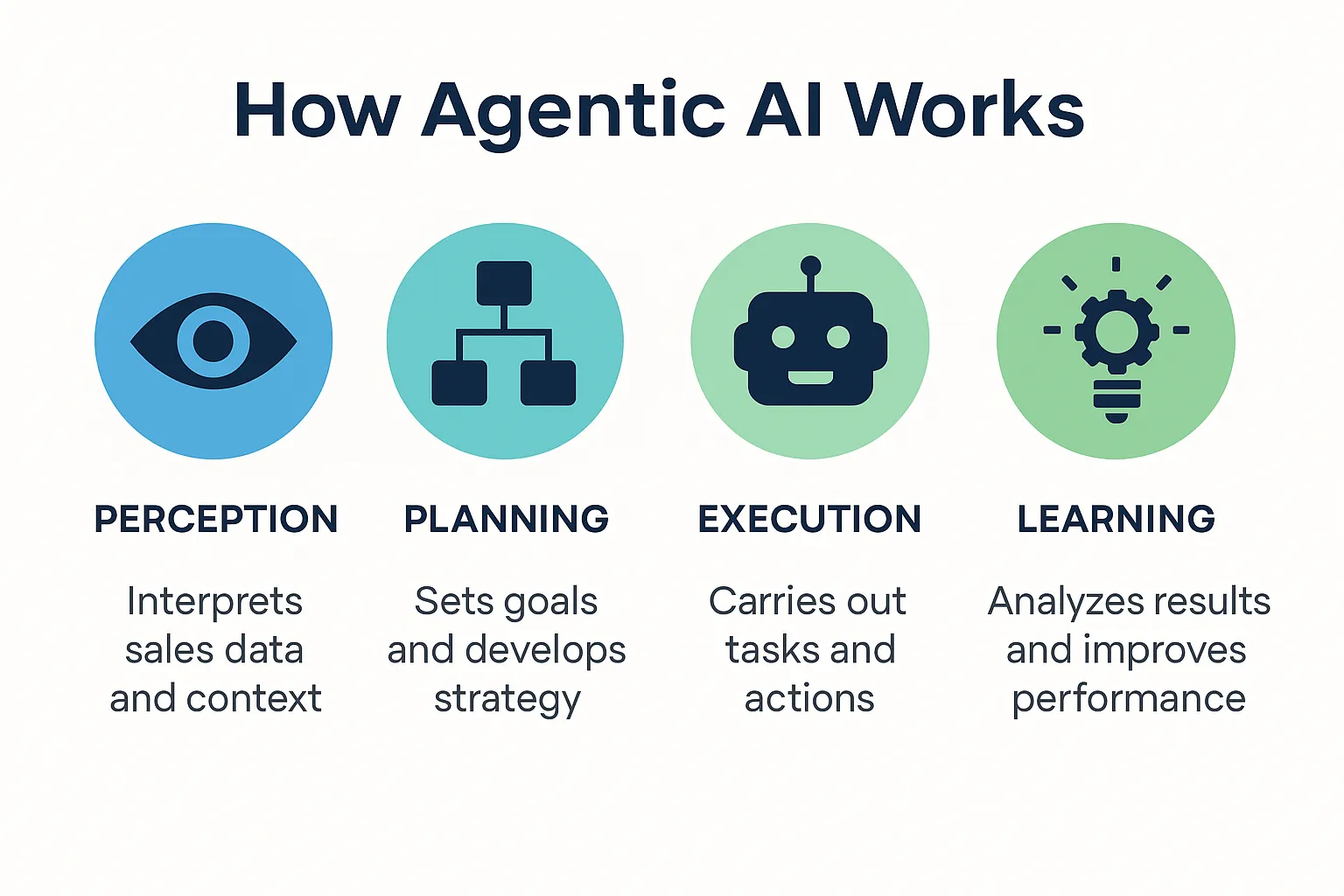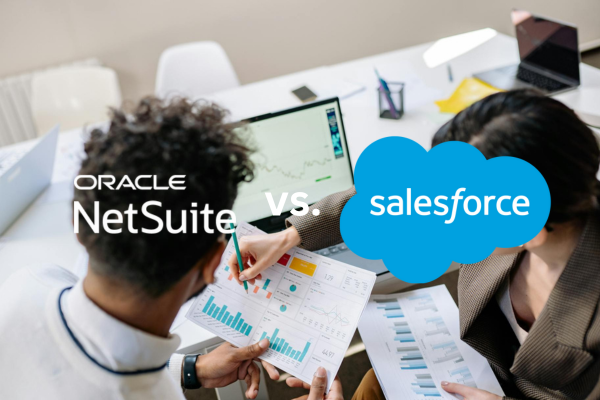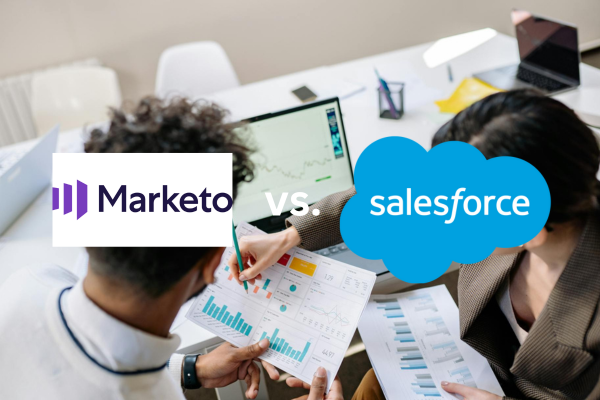Artificial intelligence is becoming more commonplace in B2B sales. It might even be considered a necessity at this point. Over the last five years, sales organizations have aggressively implemented automation tools to streamline workflows, prioritize leads, and generate insights. Yet, these tools have one thing in common: they require human intervention. Now, a new wave of intelligence is entering the conversation–Agentic AI.
Agentic AI refers to AI-driven systems that can autonomously perceive, decide, and act in pursuit of a goal, often in dynamic environments. Unlike traditional rule-based automation or reactive machine learning models, these autonomous agents proactively manage tasks across sales pipelines, from identifying opportunities to executing multi-step outreach campaigns without human prompts.
In 2025, forward-leaning B2B sales organizations aren’t just adopting AI—they’re deploying agents.

Why Agentic AI Matters Now
The market is saturated with tools promising to optimize sales productivity. What sets Agentic AI apart is its capacity for independent decision-making. These AI agents operate under defined objectives but don’t require minute-by-minute oversight. That shift unlocks compounding efficiency gains, especially in areas where traditional sales enablement tools hit a ceiling:
- Lead discovery and prioritization based on intent signals and behavior patterns
- Hyper-personalized messaging crafted and delivered at scale
- Pipeline acceleration through automated task follow-up and meeting coordination
- Continuous learning from interaction outcomes to improve future performance
Related Article: AI Sales Training: Empowering Teams to Use Advanced Technology
This evolution is timely. Inboxes are overloaded, buyers are harder to engage, and sales cycles are lengthening. Agentic AI helps sellers stay proactive without being present, creating a 24/7 revenue engine.
Key Applications in B2B Sales
The rise of Agentic AI is reshaping B2B sales operations from the ground up. These intelligent systems are not just enhancing efficiency—they are taking over core sales activities with a level of autonomy that unlocks new productivity frontiers. Below are some of the most impactful applications already transforming how teams engage, qualify, and convert leads.
1. Autonomous Lead Qualification
AI agents can ingest data from CRMs, web behavior, email interactions, and third-party sources to rank leads based on buying intent. Instead of relying on static scoring models, agentic systems dynamically adjust priorities in real time.
2. Multichannel Engagement
Tools like Lemlist, Instantly, and Expandi now integrate with AI agents that autonomously draft, schedule, and send outreach across email, LinkedIn, and SMS—tailored to each lead's profile and engagement history.
3. Meeting Booking and Coordination
AI-powered schedulers go beyond setting meetings. With natural language capabilities, agents can handle back-and-forth scheduling, rescheduling, and pre-meeting prep autonomously, improving speed to connect.
4. Content Personalization at Scale
Sales reps often struggle to tailor collateral. Agentic systems can analyze persona data and deal stage to generate custom case studies, ROI models, and one-pagers—on the fly.
5. Post-Engagement Nurture
After a call or demo, autonomous agents can follow up, send recaps, share tailored assets, and surface next steps without rep involvement.
Related Article: Top Sales AI Tools in 2025
How It Works: Inside an AI Agent
Understanding how agentic systems operate is essential for both technical teams and sales leaders evaluating this shift. These are not just scripts or workflows—they are intelligent digital workers that combine real-time perception, planning, execution, and self-improvement to deliver consistent results. Here’s a look under the hood:

An Agentic AI system typically combines the following components:
- Goal Definition Layer: The system understands high-level objectives (e.g., qualify a lead, book a meeting, re-engage a dormant contact).
- Perception Module: Continuously scans CRM, email, web, and third-party data for context.
- Planning Engine: Selects appropriate actions to meet the objective (send email, change lead score, escalate to human rep).
- Action Executor: Performs those actions autonomously, logging results for review.
- Learning Feedback Loop: Updates future behavior based on outcome data.
Related Article: AI Sales Agent: 5 Tips for Success
This makes Agentic AI not just a tool, but a virtual colleague.
Strategic Advantage: Why This Matters for Sales Leaders
Agentic AI isn’t just a tactical upgrade—it’s a strategic multiplier. For sales leaders under pressure to deliver growth with leaner teams and tighter budgets, these agents offer a pathway to rethink operating models entirely. By automating early-funnel execution and augmenting rep capabilities, AI agents open the door to significant and measurable impact:
- Speed: Reduce time-to-contact and time-to-close with 24/7 engagement
- Scale: Touch 10x more leads without additional headcount
- Relevance: Tailor every interaction based on live data
Sales leaders can reallocate reps to high-value, late-stage selling activities while agents manage repetitive, early-funnel engagement.
Tools Leading the Way
The technology ecosystem surrounding agentic sales enablement is expanding rapidly. Platforms are racing to integrate or build autonomous capabilities that go far beyond workflow automation. Below are some of the standout tools driving momentum in this space:
- Agentforce: Combines Data Cloud, Sales Cloud, and autonomous workflows to automate prospecting and early engagement.
- Apollo: Blends contact data with AI agents for automated outreach sequencing.
- ZoomInfo: Now offering agentic integrations that trigger outbound workflows based on data enrichment events.
- Overloop & Reply: Introduce AI agents that independently run outreach campaigns.
Each brings a different lens, but the common thread is AI that acts, not just informs.

Implementation Pitfalls to Avoid
While the benefits of Agentic AI are clear, successful deployment demands more than just installing new software. Many organizations stumble because they overlook foundational readiness or underestimate the cultural shift required. To realize the full ROI, companies must approach implementation deliberately:
- Lacking a unified data foundation (disconnected systems = bad AI decisions)
- Failing to define clear agent objectives (vague goals lead to erratic behavior)
- Neglecting human-AI governance (agents must hand off at the right time)
- Skipping rep training (users must know how to guide and interpret AI actions)
Success requires both tech and change management.
Preparing for the Autonomous Future
Agentic AI isn’t a trend—it’s a structural change in how revenue teams operate. As these technologies move from early adoption to mainstream deployment, sales organizations that proactively prepare will outperform. That preparation includes not only technical readiness but also a mindset shift across leadership and teams. Here’s how to build the foundation:
- Audit your sales stack for automation gaps and data silos.
- Identify use cases where agents could offload repetitive work.
- Pilot with purpose by starting small, measure rigorously, scale with insight.
- Invest in AI literacy and train reps to work with AI, not against it.
Your Partner for Agentic AI Implementation
Agentic AI is the most transformational force to hit B2B sales since CRM. For the first time, sellers can scale themselves—not just their systems. Organizations that embrace autonomous agents will not only outpace competitors in efficiency but create entirely new revenue motions that weren’t possible before.
The future of sales isn’t rep-only or AI-only. It’s a hybrid of human strategy and autonomous execution. At Gerent, we help companies unlock this potential.
Ready to deploy Agentic AI? Talk with one of our AI sales enablement experts today.










